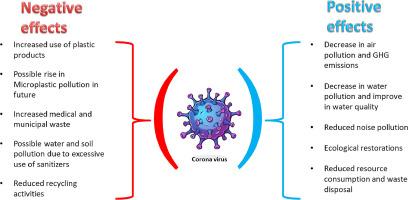Positive and negative impacts of COVID-19 on the environment: A critical review with sustainability approaches
IF 2.7
引用次数: 0
Abstract
Coronavirus, which practically brought the world to a standstill, is a member of the Coronaviridae family of the order Nidovirales, and was termed as the "severe acute respiratory syndrome coronavirus 2″ (SARS-CoV-2) by the International Committee on Taxonomy of Viruses. The COVID-19 pandemic was probably the most critical healthcare and scientific challenge of this century. Apart from health concerns, the pandemic has also resulted in certain long-lasting social, economic, and environmental issues. The article, for the first time, executes a multidisciplinary assessment of the effects of COVID-19 on the environment, highlighting future research approaches and the possible ways to achieve sustainability in the post-COVID era. Both positive and negative impacts of COVID-19 pandemic are discussed in this context. While there are certain positive impacts of COVID-19 on the environment (including reduced air, water and noise pollution with cleaner landscapes), the negative impacts (increased production and consumption of plastics, increase in waste generation because of online consumption, decrease in waste recycling, energy consumption in vaccine manufacturing) pose considerable threats to the environment. We highlight urgent research priorities, and also discuss potential means of tackling any such pandemic in the future without hampering sustainable lifestyle or jeopardizing the environment and ecosystem dynamics. The findings will help to identify the possible areas of concern of pandemic management and can help in formulation of policies which will be helpful to reduce the impact of future pandemics on the environment.

COVID-19 对环境的积极和消极影响:采用可持续发展方法进行严格审查
冠状病毒是尼多病毒目冠状病毒科的一种病毒,被国际病毒分类委员会称为 "严重急性呼吸系统综合征冠状病毒 2"(SARS-CoV-2)。COVID-19 大流行可能是本世纪最严峻的医疗保健和科学挑战。除健康问题外,大流行还造成了一些长期的社会、经济和环境问题。本文首次对 COVID-19 对环境的影响进行了多学科评估,强调了未来的研究方法以及在后 COVID 时代实现可持续发展的可能途径。在此背景下讨论了 COVID-19 大流行的积极和消极影响。尽管 COVID-19 对环境有一定的积极影响(包括减少空气、水和噪音污染,使景观更清洁),但其负面影响(塑料生产和消费增加、在线消费导致废物产生量增加、废物回收利用减少、疫苗生产过程中的能源消耗)也对环境构成了相当大的威胁。我们强调了当务之急的研究重点,并讨论了在不妨碍可持续生活方式或危害环境和生态系统动态的情况下,应对未来任何此类流行病的潜在方法。研究结果将有助于确定大流行病管理的可能关注领域,并有助于制定有助于减少未来大流行病对环境影响的政策。
本文章由计算机程序翻译,如有差异,请以英文原文为准。
求助全文
约1分钟内获得全文
求助全文
来源期刊

Hygiene and environmental health advances
Environmental Science (General)
CiteScore
1.10
自引率
0.00%
发文量
0
审稿时长
38 days
 求助内容:
求助内容: 应助结果提醒方式:
应助结果提醒方式:


